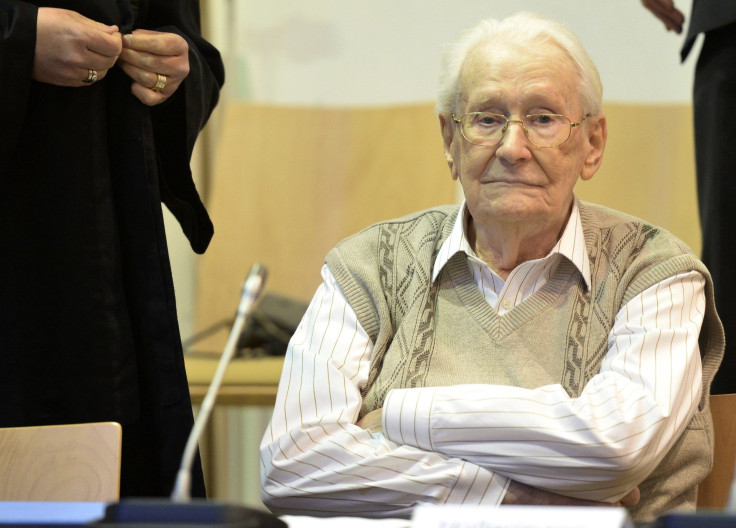Who Is Oskar Groening? Former ‘Bookkeeper Of Auschwitz’ To Stand Trial In Germany

Oskar Groening, a former Nazi guard at the Auschwitz concentration camp in Poland, will be tried as an “accessory to murder” in 300,000 cases at a German court on Tuesday. Groening, 93, has, in the past, denied being an accomplice to the mass killing of Jews at Auschwitz, instead, choosing to describe himself as a “small cog in the gears.”
Groening, known as the “bookkeeper of Auschwitz,” is facing charges related to the period between May and July 1944, when over 425,000 Jews arrived at Auschwitz. Of these, at least 300,000 were directly sent to the gas chambers. During his role as a prison guard, Groening was allegedly responsible for counting banknotes confiscated from the prisoners and guarding the victims’ luggage in the camp. Prosecutors have also accused him of hiding the victims' luggage from new arrivals.
“Through his activities, he provided the Nazi regime with economic advantage and supported systematic killings,” the public attorney's office in Hannover had previously said in a statement, according to media reports.
Groening has spoken publicly about his time at Auschwitz in past interviews with Germany’s Der Spiegel magazine and the BBC. However, he has insisted that he was not personally responsible for the mass extermination of Jews at the camp.
“(At the time) we were convinced by our world view that we had been betrayed ... and that there was a great conspiracy of the Jews against us,” Groening told Der Spiegel magazine in 2005. “If you can describe that as guilt, then I am guilty, but not voluntarily. Legally speaking, I am innocent.”
Until recently, this might have been true. However, in 2011, the legal basis for prosecuting ex-Nazis was changed with the trial of John Demjanjuk, a former extermination camp guard. With Demjanjuk's conviction, the standard of proof for such trials was lowered, so that courts could sentence a person for having served at a concentration camp, even if they were not directly involved in a specific crime.
“Those who commit crimes today must know they will be held responsible in the future,” Hedy Bohm, an Auschwitz survivor from New York, who would be attending the trial, reportedly said. “And never again will they be able to just plead -- ‘I'm a cog in the machinery, I didn't kill.’”
© Copyright IBTimes 2025. All rights reserved.





















